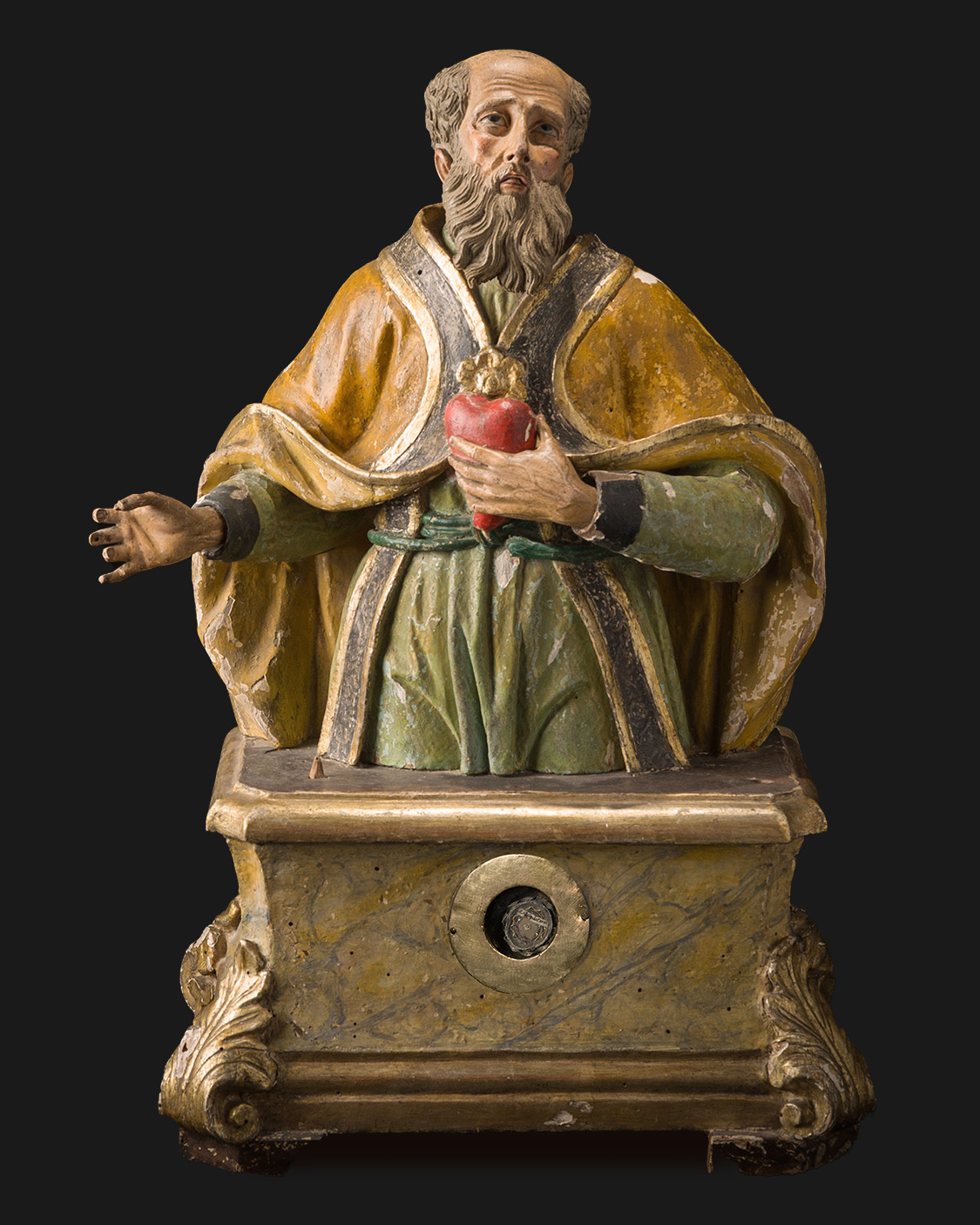St. Augustine reliquary with Ex Ossibus relic, polychrome wood, gilded, Italy, 18th century.
4100,00 zł
An expressive figural sculpture depicting a half-figure of St. Augustine in episcopal vestments, with a heart in his hand. The sculpture is the finial of a console in which was placed a relic of the first class (Ex Ossibus), described “S. Augustini”, protected by an intact church seal. The work of polychrome and gilded wood, made in the 18th century, in an Italian workshop, representing a good artistic level.
1 in stock
Relics of St. Augustine
St. Augustine's first-class relic (Ex Ossibus) is a a relic of the saint's body, typically a bone fragment, secured with an intact ecclesiastical seal, inscribed “S. Augustini” and placed in a metal capsule within the console beneath the figure.



Historical context
Baroque religious sculpture typical of Italian woodcarving. Reliquaries with bone from the saint, with the original Church seal served a sacred and educational function, attracting pilgrims, as an object of worship and adoration, used in Catholic religious practice.
Artistic qualities
Baroque sacred art showing a saint in ecstasy with an emotional expression on his face and heavily undulating robes. Glass eyes and a heart in the hand (a symbol of spiritual devotion) enhance the emotional message of the figure. The reliquary is distinguished by its realistic modeling and high level of workmanship characteristic of Roman and Lombard centers.
Collector's value
A collector's or display object, but also a religious object. It can be displayed in private chapels, sacred spaces, museums or galleries of religious art. Old reliquaries, especially figural ones, with their dedicated relics preserved, are a rarity on the antiquarian market.



St. Augustine - the Church Father who thought with his heart
St. Augustine of Hippo (354–430) is one of the most important figures in Church history – a philosopher, theologian, bishop, and author of works that shaped foundations of christian doctrine and spirituality. His writings, such as "Confessions" and "On the State of God," combined deep introspection with intellectual reflection on the human destiny, sin and grace.
As Father of the Church and Doctor of the Western Church, Augustine had an enormous influence on medieval theology, philosophy and liturgy. In iconography, he was often depicted as an old man in episcopal robes, with a book or a heart - symbols of knowledge and spiritual fervor.
In the Baroque era, his figure returned as an emblem of learned holiness and spiritual struggle, perfectly aligning with the Counter-Reformation's need for a deeper experience of faith. Sculptures such as this combined intellectual and emotional messages, making Augustine not only a saint, but a spiritual guide of entire generations.
Are you looking for Baroque sacred sculpture or antique religious art?
The offer of the SYBARIS Early Art Gallery includes carefully selected objects from the field of European sacred woodcarvingincluding statues of saints, works of religious art from the 18th century and other examples of baroque wooden sculpture.
We invite you to purchase this unique sculpture of St. Augustine with the EX OSSIBUS relic, or browse our collection of religious artifacts available in our permanent offer.
| Weight | 4,4 kg |
|---|---|
| Dimensions | 34 × 24 × 50 cm |
| Form |
Half figure of St. Augustine with a red heart in his hand |
| Technika |
Baroque workshop woodcarving ,Gildings ,Layered polychromy |
| Kolorystyka |
Gold ,Green ,Red |
| Czas powstania |
18th century (1701-1800) |
| Era |
Baroque |
| Kraj pochodzenia |
Italy |
| Autor |
Typical of the Italian Baroque period ,Unknown |
| Stan zachowania |
Light losses in polychrome ,Potholes from inactive woodchucks ,Secured relic ,Several fingers of the right hand are missing ,Very good |
Related products
Brahma, marble, India, 19th (?) century.
Christ Salvator Mundi, polychrome wood, Poland, 19th century.
Gallo-Roman sculpture of the head of Eros (?), marble, 1st-3rd century A.D.
Icon of Our Lady of the Dawn Gate, brass, enamel on metal, Poland, 19th century.
Madonna and Child, polychrome wood, gilded, Central Europe, 18th/19th century.
Saint John the Evangelist, late Gothic wooden sculpture, ca. 1500
The work may have been part of a winged altarpiece (retabulum), most likely in the Crucifixion group.









